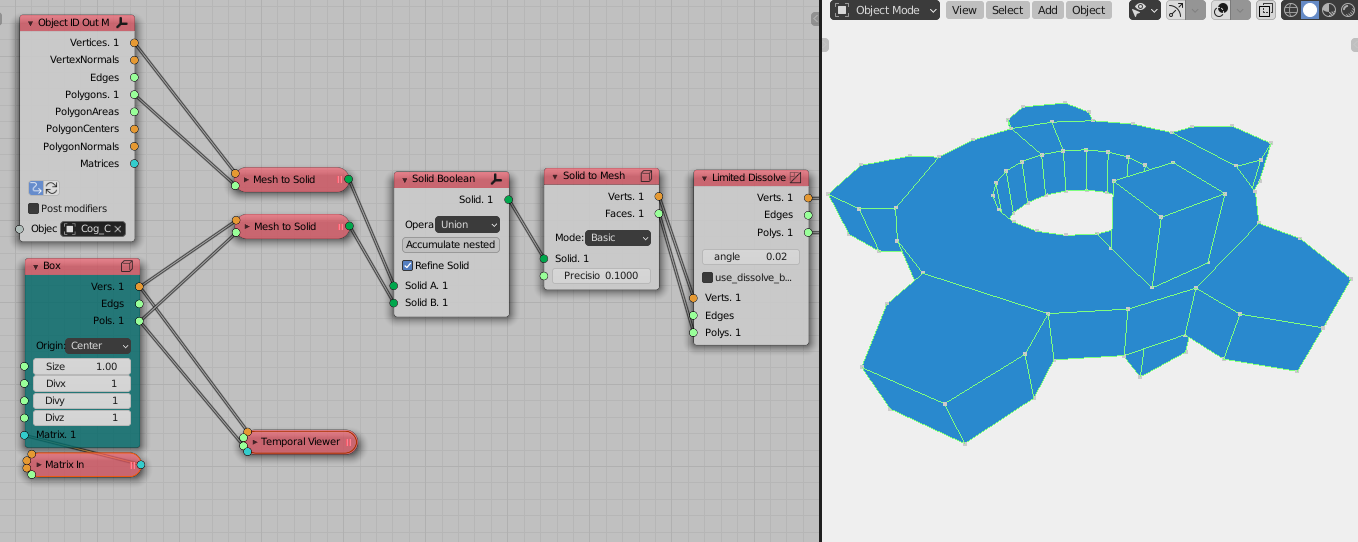-
Notifications
You must be signed in to change notification settings - Fork 228
New issue
Have a question about this project? Sign up for a free GitHub account to open an issue and contact its maintainers and the community.
By clicking “Sign up for GitHub”, you agree to our terms of service and privacy statement. We’ll occasionally send you account related emails.
Already on GitHub? Sign in to your account
csg boolean node crashes given this .blend #3430
Comments
|
Would be interesting to see performance differences. |
|
yummy. maybe this is going to happen https://pymesh.readthedocs.io/en/latest/mesh_boolean.html |
|
Also FreeCAD offers "mesh boolean"... but it seems it depends on OpenSCAD |
|
oh.. what have i done? """
in verts_a v
in faces_a s
in verts_b v
in faces_b s
in precision s d=0.1 n=2
out verts_new v
out faces_new s
enum = common fuse cut
"""
def ui(self, context, layout):
layout.prop(self, 'custom_enum', expand=True)
import Part
import Mesh
from FreeCAD import Base
from sverchok.nodes.solid.mesh_to_solid import ensure_triangles
from sverchok.data_structure import updateNode, match_long_repeat as mlr
verts_a = self.inputs[0].sv_get(deepcopy=False)
faces_a = self.inputs[1].sv_get(deepcopy=False)
verts_b = self.inputs[2].sv_get(deepcopy=False)
faces_b = self.inputs[3].sv_get(deepcopy=False)
for v1, f1, v2, f2 in zip(*mlr([verts_a, faces_a, verts_b, faces_b])):
tri_faces = ensure_triangles(v1, f1, True)
faces_t = [[v1[c] for c in f] for f in tri_faces]
mesh = Mesh.Mesh(faces_t)
shape = Part.Shape()
shape.makeShapeFromMesh(mesh.Topology, precision)
shape = shape.removeSplitter() # may slow it down, or be totally necessary
solid_a = Part.makeSolid(shape)
tri_faces_2 = ensure_triangles(v2, f2, True)
faces_t_2 = [[v2[c] for c in f] for f in tri_faces_2]
mesh_2 = Mesh.Mesh(faces_t_2)
shape_2 = Part.Shape()
shape_2.makeShapeFromMesh(mesh_2.Topology, precision)
shape_2 = shape_2.removeSplitter() # may slow it down, or be totally necessary
solid_b = Part.makeSolid(shape_2)
solid_out = getattr(solid_a, self.custom_enum)(solid_b)
solid_out = solid_out.removeSplitter()
rawdata = solid_out.tessellate(precision)
b_verts = [(v.x, v.y, v.z) for v in rawdata[0]]
verts_new.append(b_verts)
faces_new.append(rawdata[1])example snlite enums and lib import freecad |
|
nice work @vicdoval this was very easy to cobble together :) |
|
or even """
in verts_a v
in faces_a s
in verts_b v
in faces_b s
in precision s d=0.1 n=2
out verts_new v
out faces_new s
enum = common fuse cut
"""
def ui(self, context, layout):
layout.prop(self, 'custom_enum', expand=True)
import Part
import Mesh
from FreeCAD import Base
from sverchok.nodes.solid.mesh_to_solid import ensure_triangles
from sverchok.data_structure import updateNode, match_long_repeat as mlr
verts_a = self.inputs[0].sv_get(deepcopy=False)
faces_a = self.inputs[1].sv_get(deepcopy=False)
verts_b = self.inputs[2].sv_get(deepcopy=False)
faces_b = self.inputs[3].sv_get(deepcopy=False)
def mesh_to_solid(verts, faces, precision):
tri_faces = ensure_triangles(verts, faces, True)
faces_t = [[verts[c] for c in f] for f in tri_faces]
mesh = Mesh.Mesh(faces_t)
shape = Part.Shape()
shape.makeShapeFromMesh(mesh.Topology, precision)
shape = shape.removeSplitter() # may slow it down, or be totally necessary
return Part.makeSolid(shape)
for v1, f1, v2, f2 in zip(*mlr([verts_a, faces_a, verts_b, faces_b])):
solid_a = mesh_to_solid(v1, f1, precision)
solid_b = mesh_to_solid(v2, f2, precision)
solid_out = getattr(solid_a, self.custom_enum)(solid_b)
solid_out = solid_out.removeSplitter()
rawdata = solid_out.tessellate(precision)
b_verts = [(v.x, v.y, v.z) for v in rawdata[0]]
verts_new.append(b_verts)
faces_new.append(rawdata[1]) |
|
@vicdoval so we need some |
|
i mean.. we don't need.. but it would be useful. |
|
there is a utils/solid.py file with the |
|
yes, i'll do that. maybe the 3 different flavours. |
|
prelim docs multi-Boolean (FreeCAD)
---
prerequisits: FreeCAD
This node uses a 3rd party library to perform boolean meshes. It will work more robustly than the standard Sverchok
boolean node.
The meshes must satisfy a few characteristics
- must be closed meshes. (closed like air-tight).
- must be manifold, no edge may connect more than 2 faces / no part of the mesh shall self intersect.
- your mesh will also not have vertices that overlap (ie exist in identical 3D space)
The inputs can be iteratively merged or not, so if the inputs are A and B and the output is C, then you can have two
forms of output.
'''
C = (A1+B1) + (A2+B2) + (A3+B3) (iteratively)
C1, C2, C3 = A1+B1, A2+B2, A3+B3 (individual)
'''
as a post processing step (if you don't want the default triangle-only output) you can use a built-in simplify surface
function to get quads or larger n-gons
Efficiency
----------
The node uses the FreeCAD library, which in turn deals with solids. Internally this node converts all meshes to solids
every time the node is told to update. This is not computationally efficient, by any stretch of the imagination, but we
offer the node as a convenience for fast prototyping. The demanding user will prefer the ability to get a good boolean
result, and pay the computational price of the overhead incurred by the `mesh_to_solid` function.
Due to the way Sverchok evaluates the nodetree, it may be more efficient to convert your meshes explicitly to Solids, and
use the Boolean Node from the Solids (-> operations) menu. This boolean node does all that under the hood. The
trade-off is user-convenience *vs* computational-efficiency.
Macro
-------
When you're happy about the result of the Boolean (FreeCAD) node, you can increase computational efficiency by running
the Macro ( `CBTS' ) "convert bool to solid". This macro will replace the multi-boolean FreeCAD node,, with Two
`Mesh-to-Solids` nodes, directly connected to the Solids Boolean node, and outputting to a `Solid-to-Mesh` node, and a
simplify node with the same settings as the boolean node it replaced. This expands the nodetree, but the result allows
you to potentially incur less overhead, for example: if you actively transform the solids prior to doing the boolean, then only the boolean operation is repeatedly done, but the mesh-to-solid conversion is done only once (or if something upstream from the mesh-to-solid nodes changes)
(show image)
If you don't care about efficiency, it's fine to use the brute-force method :) |


again user at blenderartists gives an example where Sverchok crashes with no useful information, if the boolean node is connected to an output.
https://drive.google.com/file/d/1ZO0VlOqmzS6EculTa-LfRlF4z7549eOz/view
maybe recursion limit? maybe time for an alternative boolean library :)
mesh-to-solid - > boolean -> solid-to-mesh -> llimited dissolve, does work nicely tho.

The text was updated successfully, but these errors were encountered: